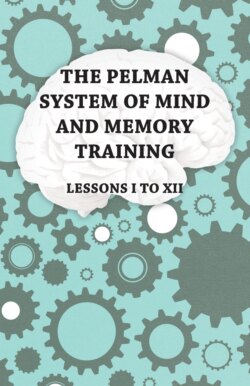Читать книгу The Pelman System of Mind and Memory Training - Lessons I to XII - Анон - Страница 63
На сайте Литреса книга снята с продажи.
XV. MEMORY TRAINING. The Cost of Forgetfulness.
Оглавление20. Forgetfulness is both irritating and costly in any sphere of life, and this is particularly true in the world of business. You miss an appointment and lose a big contract; you forget to put your cheque book in the safe, and it is used by others to your disadvantage; the signalman forgot to pull the lever and the train was wrecked. Forgetfulness has exacted a heavy toll in human lives and a still heavier toll in money. The business man may sometimes forget an important item even when he has taken pains to enter it in his diary and to keep that diary open before him. We will give you an instance founded on fact.
Below is a page showing the appointments for the day:—
Monday, December 7th, 1914.
Sales Manager, 10 a.m.
Johnson’s case.
Paper supply.
Lunch, Simpson’s with Blake, 1 p.m.
Interview, 2.30 p.m., Jones.
Interview, 3.30, Willington,
Manchester.
You will see there is an appointment for 2.30 p.m. and another some distance away at 3.30. The one at 3.30 is the most important one of the day, but when Mr. Jones came at 2.30 and brought information of a serious import, Mr. Williamson became so absorbed in the possibilities of money-making that he forgot all about the 3.30 appointment until about 3.5 p.m. Mr. Jones was not particularly pleased at the sudden termination of the interview, and Mr. Williamson was ten minutes late in arriving at his destination. Those ten minutes cost him exactly £150 apiece, for a contract he hoped to have obtained fell through, he not having been present to time in order to see that his claim was properly conducted. This kind of forget-fulness occurs frequently with men who have good memories, as well as with men who have not good memories. The bad memory forgets entirely; the good memory forgets because something unusual happens, and for the moment crowds out of mind the thing that has to be remembered.
The point to be noted is: that if we are to remember a thing at the right time, we have need of more than a good memory; we need a systematic handling of our attention. Thus, if Mr. Williamson had kept a watch on himself, he would not have allowed the interview with Mr. Jones to absorb his interest to the full; he would have had an eye on the clock without allowing Mr. Jones to know it.
